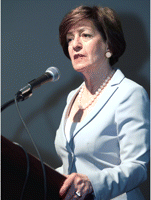Mood Disorders May Look Different in DSM-5
Abstract
David Kupfer, M.D., a professor of psychiatry at the University of Pittsburgh, and Darrel Regier, M.D., M.P.H., director of APA's Division of Research and executive director of the American Psychiatric Institute for Research and Education, are the chair and vice chair, respectively, of the DSM-5 Task Force.
To keep psychiatrists and other interested parties informed on the revised manual's development process, they organized a symposium at the APA annual meeting in Honolulu in May on "Mood Disorders Across the Lifespan: Implications for DSM-5." As Regier explained, "We are trying to focus more on this subject than we did in DSM-IV."
Here are some of the questions that were addressed at the symposium concerning mood disorders and DSM-5, although not all were directly related to lifespan issues.
• Should an Energy Change Constitute a Bipolar Criterion?

"We are viewing this as a minor change," said Ellen Frank, Ph.D., regarding energy as a criterion for mood disorders.
In addition to elation and euphoria, people with bipolar disorder often experience a change in energy, Ellen Frank, Ph.D., reported. Frank, a professor of psychiatry at the University of Pittsburgh, is on the DSM-5 Mood Disorders Work Group. Thus, a change in energy will be included as one of the criteria for bipolar disorder in DSM-5, Frank said. "We are viewing this as a minor change," she noted, because such energy changes are already implicit in the DSM-IV criteria for bipolar disorder.
The inclusion of a change in energy as a criterion, Frank explained, should make the diagnosis of bipolar disorder a little easier than it currently is since people are more likely to recall when they had an energy change than when they had a mood change.
• Should the Bereavement Exclusion for Major Depression Remain?
If, for example, a 63-year-old man is despondent for three to four weeks, is his diagnosis major depressive disorder? Perhaps. But suppose his despondency is due to his wife dying. DSM-IV would say that he is bereaved, not depressed, Sidney Zisook, M.D., a professor of psychiatry at the University of California, San Diego, said.
But what is grief? Zisook asked. It is disbelief and yearning to be with the one who died. Such emotions may occur every day for six months and periodically thereafter. They may also be mixed with other emotions—say, humor or warm recollections. So grief is not depression, he explained.
Yet grief is a stressor that can precipitate a major depression, Zisook asserted, which raises this question: Is grief-triggered depression the same as non-grief-triggered depression? Zisook looked at the evidence, and some studies suggested yes, others no. But most of the studies implied that grief-triggered depression is the same as non-grief-triggered depression. For instance, in one study, antidepressants helped patients who were depressed in the wake of the grieving process without impairing that process.
So, since grief seems to differ from depression, and since grief-triggered depression seems to be the same as major depressive disorder, the bereavement exclusion from major depressive disorder should remain in DSM-5, Zisook concluded.
However, he pointed out, some have proposed that grief that endures longer than six months—often called complicated grief—should be given its own diagnosis in DSM-5. Zisook said this in response to a psychiatrist in the audience who reported that he was experiencing complicated grief in the wake of his wife's death and wondered how complicated grief was going to be handled in DSM-5.
• Should Late-Life Depression Be Added As a Distinct Diagnosis?
Does depression in later life differ from depression in earlier life? It appears that it does, Dan Blazer, M.D., a professor of psychiatry at Duke University and acting chair of the DSM-5 Neurocognitive Work Group, reported.
For instance, a number of studies have shown that people tend to experience less depression later in life than in mid-life, yet, ironically, the symptoms of depression seem to increase in later life. Moreover, it is much more common to see psychotic depression in older people than in middle-aged individuals. And unlike depressed individuals of middle age, older depressed people may not demonstrate outright sadness as a key symptom, but express their depression in the form of aches and pains and a lack of pleasure.
Yet while late-life major depression differs from major depression in middle age in several ways, the differences are not enough to justify including a separate diagnosis for late-life major depression in DSM-5, Blazer stated.
• Should Bipolar Disorder in Children Become a Distinct Diagnosis?
More and more children have been diagnosed with bipolar disorder in recent years, David Shaffer, M.D., a professor of child psychiatry at Columbia University and a member of the DSM-5 Task Force, reported. He hypothesized that in previous years when less was known about bipolar depression in youth, many of them would have been diagnosed with attention-deficit/hyperactivity disorder instead of bipolar disorder, since the two disorders share certain symptoms, for example, disinhibition and irritability.
Shaffer did not, however, express an opinion on whether in DSM-5 childhood bipolar disorder should be considered a distinct diagnosis or continue to be classified under the rubric of "Bipolar Disorder Not Otherwise Specified."
Kupfer indicated that he, Regier, and the other experts involved in the DSM-5 development process welcome input from psychiatrists on the subject of mood disorders across the lifespan. Psychiatrists can post their comments on the DSM-5 Web site at <www.dsm5.org/Pages/Default.aspx>.



